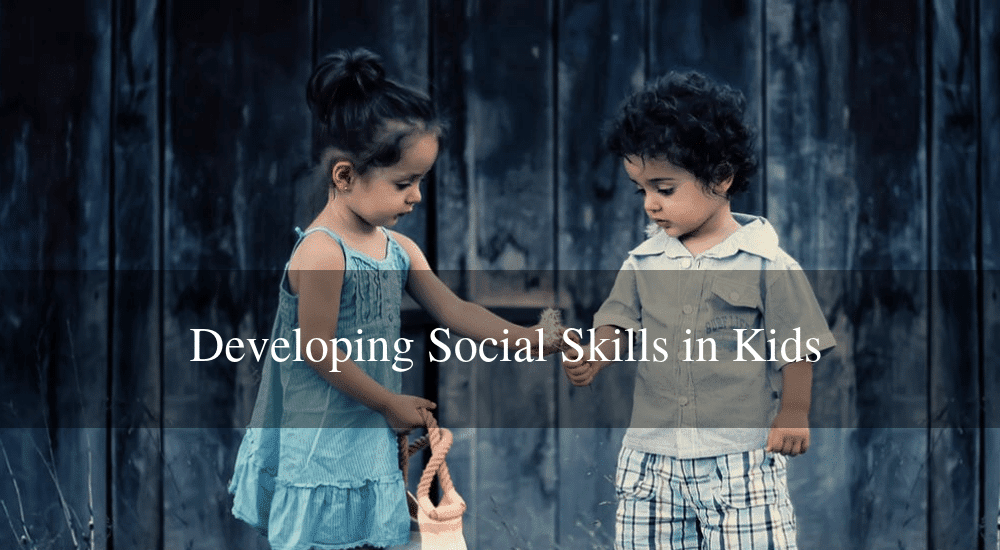
It’s no secret that modern lifestyles have a significant impact on children’s emotional state. It’s not uncommon for kids to be emotionally unavailable or overwhelmed due to various factors in their environment. A decline in social, emotional, and academic functioning in children is a common occurrence in today’s world, leading to learning disabilities and other diagnoses. However, it’s important to remember that the brain is highly malleable, especially during childhood. The environment and experiences a child has can either strengthen or weaken their brain development. Therefore, it’s essential for parents to carefully mold their child’s character and help them develop important social skills.
What Are Social Skills and Why Are They Important?
Social skills refer to the ability to effectively interact and communicate with others. These skills include but are not limited to:
- Making and maintaining friendships
- Asking and answering questions
- Sharing and taking turns
- Listening and paying attention
- Respecting others’ feelings and boundaries
- Expressing emotions appropriately
Having good social skills is important for children’s overall development and well-being. It helps them form meaningful connections with others, build self-esteem, and improve their academic and professional performance. Without strong social skills, children may struggle to make and maintain friendships, communicate effectively, and navigate social situations.
5 Ways to Develop Social Skills in Kids:
Encourage patience

One essential social skill that kids often struggle with is patience. In today’s fast-paced world, it’s easy for children to become accustomed to getting what they want instantly. However, it’s crucial to teach kids the value of waiting and not always getting their way immediately. This will not only help them learn the value of things but also teach them how to cope with stress in the future. When kids can’t have something they want right away, it helps them develop the ability to delay gratification. This skill is essential for managing stress and frustration in both personal and professional settings.
Limit technology use

Technology, with its dominant presence, poses a significant threat to children’s brain development. It’s essential for parents to be mindful of how much time their children spend on screens and the types of content they consume. Too much exposure to technology can hinder a child’s social skills by replacing human interaction with virtual reality. Children who spend too much time on screens may become less familiar with the unstructured natural environment and miss out on valuable outdoor playtime. This lack of interaction with others can make it difficult for kids to learn and practice social skills.
Give them responsibilities

Another effective way to help kids develop social skills is to give them responsibilities. Allowing your child to help with household tasks and responsibilities can teach them important skills such as teamwork, communication, and problem-solving. It’s essential to involve kids in age-appropriate tasks that they can handle independently. This not only helps them feel valued and capable but also gives them the opportunity to practice social skills in a real-life setting.
Encourage empathy

Empathy is the ability to understand and relate to the emotions of others. It’s an essential social skill that helps children form meaningful connections with others and navigate social situations effectively. To encourage empathy in your child, try role-playing different scenarios where empathy is important. Discuss different emotions and how they might affect others. It’s also essential to model empathy yourself, as children often learn by example.
Seek outside help:
If your child is struggling with social skills, it may be helpful to seek the assistance of a therapist or counselor. These professionals can provide guidance and support to help your child develop
Some questions related to child’s social skills
There are several signs that may indicate your child is struggling with social skills. These may include difficulty making friends, difficulty communicating with others, difficulty navigating social situations, and difficulty expressing emotions appropriately. If you notice any of these issues in your child, it may be beneficial to seek the assistance of a therapist or counselor.
It’s never too early to start working on your child’s social skills. Children begin learning and practicing social skills from a very young age, so it’s essential to be proactive in helping them develop these skills. However, it’s important to remember that every child is unique and may develop social skills at different rates.
There are several ways you can help your child practice their social skills at home. These may include role-playing different social situations, encouraging your child to play with others, and providing opportunities for your child to take turns and share. You can also model good social skills yourself and discuss the importance of empathy and respect with your child.
It’s important to remember that not all children are naturally outgoing or confident in social situations. If your child is shy or introverted, it’s essential to be patient and understanding. Encourage them to participate in social activities at their own pace and provide support and guidance as needed. It’s also important to remember that shyness and introversion are not the same as a lack of social skills. With time and practice, even shy or introverted children can develop strong social skills.
Yes, it’s completely normal for kids to struggle with social skills at times. Children are still learning and developing these skills, and it’s common for them to make mistakes or have difficulty navigating certain social situations. It’s essential to be patient and understanding with your child and provide support and guidance as needed. With time and practice, your child will continue to grow and improve in their social skills.
